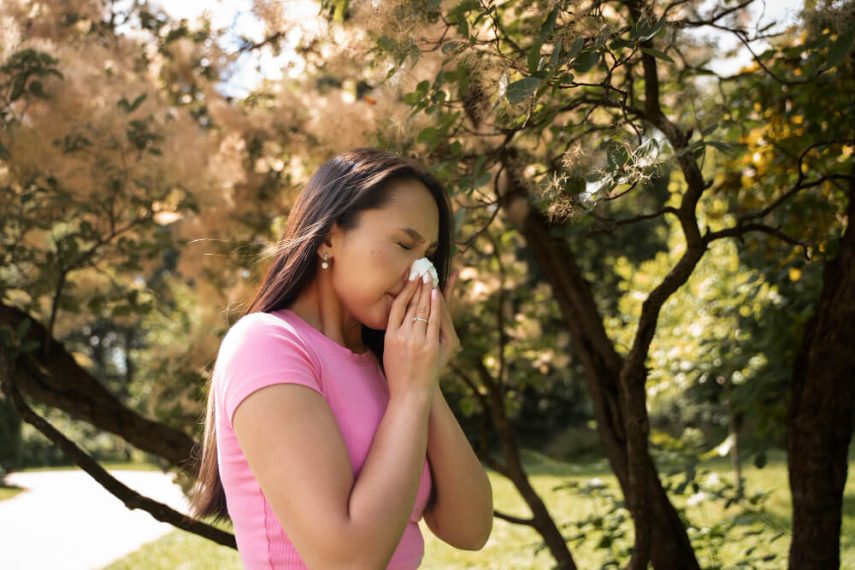Sneezing is a prevalent symptom of seasonal allergies. It occurs as the body responds to irritants like pollen or mold spores that enter the nasal passages. Frequent and uncontrollable sneezing fits are a shared experience among those who suffer from seasonal allergies.
Seasonal allergies, often perceived as a minor nuisance, can significantly impact one’s quality of life. Recognizing the right time to consult a primary care doctor is crucial for effective management and relief.

What is Seasonal Allergy?
Symptoms of Seasonal Allergies
Seasonal Allergies vs. Other Conditions
8 Signs It’s Time to Visit Your Primary Care Doctor in Bridgeport, CT
How do Primary Care Doctors Treat Seasonal Allergies?
How to Manage Seasonal Allergies at Home?
Frequently Asked Questions
✔ Persistent or worsening symptoms should prompt a visit to your primary care doctor in Bridgeport, CT.
✔ Don’t hesitate to consult Docs Primary Care – Bridgeport for effective allergy management.
✔ While helpful, home remedies should not replace professional medical advice.
✔ Simple changes in daily routine can significantly reduce allergy symptoms.
✔ Staying informed about local allergen levels can help plan outdoor activities.
✔ Regular visits to your primary care doctor can help manage seasonal allergies better.
Seasonal allergies, also known as allergic rhinitis or hay fever, are a prevalent health concern in Bridgeport, CT, and other regions with distinct seasons. According to the American Academy of Allergy, Asthma & Immunology, approximately eight percent of Americans are affected by this condition.
These allergies arise from an exaggerated immune system response to specific allergens prevalent during certain times of the year.
Spring Allergens
Summer Allergens
Fall Allergens

When individuals with sensitivities come into contact with these allergens, whether through inhalation or skin exposure, their immune systems misinterpret these substances as harmful invaders. This triggers an immune response characterized by releasing histamines and other chemicals.

Sneezing is a prevalent symptom of seasonal allergies. It occurs as the body responds to irritants like pollen or mold spores that enter the nasal passages. Frequent and uncontrollable sneezing fits are a shared experience among those who suffer from seasonal allergies.
Allergic rhinitis often leads to a runny nose (rhinorrhea) or nasal congestion. This is caused by inflammation of the nasal passages and increased mucus production. The congestion can make breathing through the nose difficult.
Itchy and watery eyes are hallmark symptoms of seasonal allergies. This condition, known as allergic conjunctivitis, results from allergens coming into contact with the eyes. The itching can be particularly bothersome and difficult to manage.
A persistent cough is a common symptom of seasonal allergies. It is often triggered by postnasal drip, where excess mucus from the nose drips down the back of the throat, causing irritation and coughing.
Throat irritation is another discomfort associated with allergic rhinitis. Repeatedly clearing the throat due to postnasal drip can lead to a sore throat.
Seasonal allergies can be physically exhausting. Constant sneezing, congestion, and poor sleep quality due to symptoms can result in fatigue and reduced energy levels.
Some individuals with seasonal allergies may experience a temporary loss of smell (anosmia) or taste (ageusia). This can occur due to nasal congestion, which limits the ability to smell and taste.
Allergies can affect the ears, causing a feeling of fullness or congestion. This is due to the interconnectedness of the ears, nose, and throat. Ear congestion may also lead to mild ear discomfort.

It’s essential to differentiate seasonal allergy symptoms from those of other conditions, such as the common cold:
Understanding these distinctions is crucial for individuals in Bridgeport, CT, who experience these symptoms. If symptoms persist and align with the seasonal patterns of allergen exposure in the region, consider consulting a reputable primary care doctor from Docs Primary Care – Bridgeport for the proper diagnosis and management of seasonal allergies.

While often perceived as minor inconveniences, seasonal allergies can sometimes escalate into more serious health issues. If you’re in Bridgeport, CT, experiencing seasonal allergy symptoms, it’s crucial to recognize when it’s time to seek help from a trusted primary care doctor in Docs Primary Care – Bridgeport. Early intervention can lead to more effective management and improved quality of life.
One of the primary indicators that it’s time to consult your primary care doctor in Bridgeport, CT, is the persistence of allergy symptoms. If you’ve been experiencing sneezing, nasal congestion, itchy eyes, and other symptoms for an extended period, it’s a sign that over-the-counter remedies may not be sufficient.
Persistent symptoms can significantly impact your daily life and productivity. Your primary care doctor can assess your condition, provide a proper diagnosis, and offer more targeted treatments. They may recommend prescription medications or allergy shots (immunotherapy) to address the underlying causes of your allergies.
While most seasonal allergy symptoms are mild to moderate, severe allergic reactions can occur in some individuals. Anaphylaxis, a severe and potentially life-threatening allergic reaction, is rare but can happen, especially in cases of severe insect allergies.
If you experience symptoms such as difficulty breathing, swelling of the face or throat, rapid heartbeat, or a drop in blood pressure, seek immediate medical attention. For those with known severe allergies, carrying an epinephrine auto-injector (EpiPen) and having a management plan from your primary care doctor is essential.
Over-the-counter (OTC) allergy medications can be effective for many people with seasonal allergies. However, if you’ve been diligently taking OTC antihistamines and decongestants, and your symptoms persist or worsen, it’s time to consult your primary care doctor in Bridgeport, CT.
Your doctor can evaluate your response to medications and determine if stronger prescription medications are needed. They may also explore alternative treatments, such as nasal corticosteroids or leukotriene modifiers, to better manage your symptoms.
If your seasonal allergies are interfering with your daily activities, it’s a clear sign that you should consult your primary care doctor in Bridgeport, CT. Allergies can affect your ability to work, study, exercise, and enjoy life fully.
Your primary care doctor in Bridgeport, CT, can help you develop strategies to manage allergies effectively, ensuring they have minimal impact on your daily life. They can also provide documentation if you need workplace, academic, or lifestyle accommodations due to allergies.
Seasonal allergies often worsen with repeated exposure to allergens over time. If you’ve noticed that your symptoms are becoming more severe each year, you should seek guidance from your primary care doctor in Bridgeport, CT.
Your doctor can assess the progression of your allergies and recommend long-term management strategies. They may suggest treatments like allergy shots to desensitize your immune system and reduce the severity of your reactions over time.
Allergies can sometimes lead to respiratory issues that affect your ability to breathe comfortably. If you experience wheezing, shortness of breath, or chest tightness due to seasonal allergies, consult your primary care doctor in Bridgeport, CT, promptly.
These symptoms may indicate the presence of allergic asthma, a condition that requires specialized treatment. Your doctor can perform lung function tests, prescribe appropriate asthma medications, and create an asthma action plan tailored to your needs.
Chronic or recurrent sinus infections (sinusitis) can be linked to untreated seasonal allergies. Allergies can inflame the nasal passages and sinuses, making them more susceptible to infections.
If you are dealing with frequent sinus infections in conjunction with your allergies, it’s time to visit your primary care doctor in Bridgeport, CT. They can assess the situation, treat the current infection, and develop a plan to manage your allergies more effectively and prevent future sinus issues.
Sometimes, it’s not just about treating symptoms but also about managing allergies in the long run. If you’re seeking comprehensive guidance on managing your seasonal allergies better, your primary care doctor in Bridgeport, CT, is your go-to resource.
Primary care doctors in Bridgeport, CT, can provide personalized advice on allergen avoidance, lifestyle modifications, and long-term management strategies. They can help you navigate the complexities of allergy triggers specific to Bridgeport, CT, and recommend steps to reduce allergen exposure.

Your primary care doctor in Bridgeport, CT, plays a central role in diagnosing and managing seasonal allergies.
Here’s a closer look at how primary care doctors approach the treatment of seasonal allergies:
Primary care doctors in Bridgeport, CT, approach the treatment of seasonal allergies with a comprehensive evaluation. This evaluation includes taking a detailed medical history, discussing your symptoms, and performing physical examinations if necessary. Additionally, they may inquire about your family’s allergy history, previous treatments, and any underlying health conditions.
Sometimes, your primary care doctor may recommend allergy testing to identify specific allergens triggering your symptoms. Common allergy tests include skin prick tests and blood tests. These tests can help pinpoint the allergens responsible for your allergies.
Your primary care doctor in Bridgeport, CT, will create a personalized treatment plan based on your evaluation and allergy test results.
This plan may include a combination of the following:
After initiating treatment, your primary care doctor in Bridgeport, CT, will schedule follow-up appointments to monitor your progress. They will assess the effectiveness of the treatment plan and make adjustments if needed. Your doctor will also address any concerns or questions you may have about the treatment plan and your progres.
Your primary care doctor in Bridgeport, CT, may provide an allergy emergency plan for individuals with severe allergies or a history of anaphylaxis. This plan outlines steps to take in case of a severe allergic reaction and may include instructions for using an EpiPen.
Your primary care doctor in Bridgeport, CT, may collaborate with specialists, such as allergists or pulmonologists if your allergies are complex or require specialized treatment. They will ensure that you receive comprehensive care tailored to your needs.
Managing seasonal allergies at home can relieve symptoms and complement medical treatments.
Here are some effective home remedies to consider:
Using a saline nasal rinse helps flush out allergens from your nasal passages, reducing congestion and irritation. You can use a saline nasal spray or a Neti pot for this purpose.
Inhaling steam can ease nasal congestion and soothe irritated airways. Boil water, place your face over the steam (carefully), and inhale the vapor with a towel draped over your head.
Reduce allergen exposure by keeping windows closed, using air purifiers with HEPA filters, and regularly cleaning carpets, curtains, and bedding. This helps minimize allergens like pollen and dust mites.
Some people find relief from seasonal allergies by consuming local honey regularly. The theory is that exposure to small amounts of local pollen in honey may desensitize your immune system over time. While more research is needed, it’s a delicious remedy to try.
Drinking plenty of water can help thin mucus secretions, making it easier to expel irritants. Staying hydrated also supports overall health and immune function.
Teas containing herbs like chamomile, peppermint, and ginger can have soothing effects on allergy symptoms. They can help alleviate congestion and throat irritation.
Non-prescription antihistamines, decongestants, and nasal corticosteroids are available for symptom relief. Consult your pharmacist, or primary care doctor in Bridgeport, CT, before using these, especially if you have any underlying medical conditions.
Pay attention to local pollen forecasts and stay indoors during peak pollen times. If you go outside, consider wearing sunglasses to protect your eyes from allergens.
Some essential oils like lavender, eucalyptus, and peppermint may offer relief when used in aromatherapy or diluted for topical application. Be cautious with essential oils if you have sensitive skin or allergies to fragrances.
On high pollen days, it’s advisable to limit outdoor activities, especially if it’s not needed. However, if you can’t avoid going out, make sure to wear protective clothing, such as a hat and sunglasses, to reduce direct exposure to allergens.
Yes, seasonal allergies can develop at any age, although they often first appear during childhood or adolescence. It’s not uncommon for adults to experience new allergy symptoms later in life.
No, seasonal allergies are different from food allergies. Airborne allergens like pollen trigger seasonal allergies, while food allergies result from consuming specific foods that trigger an immune response.
In some cases, untreated or severe seasonal allergies can contribute to the development or exacerbation of asthma. Allergic rhinitis (nasal allergies) and asthma are closely related conditions.
Alternative treatments for seasonal allergies include allergen immunotherapy (allergy shots) and sublingual immunotherapy (allergy tablets). These treatments aim to desensitize the immune system to allergens.
Over-the-counter allergy medications can be safe for short-term use, but it’s essential to consult a healthcare professional for long-term management. Prolonged use of certain medications may have side effects or lose effectiveness. The best action is to stay updated with your medical professional when adjustments or changes are necessary.
While children can outgrow seasonal allergies, adults are less likely to do so. Allergies can persist throughout adulthood, but their severity may change over time.
Yes, there can be a link between seasonal allergies and pet allergies. Allergens carried by pets, such as pollen, can exacerbate seasonal allergy symptoms in individuals who are sensitive to these allergens.
While a healthy diet can support overall immune health, it’s unlikely to provide significant relief from seasonal allergy symptoms. Specific environmental allergens trigger these symptoms, and dietary changes may have a limited impact.
Understanding the signs, symptoms, and treatment options for seasonal allergies is essential for maintaining a high quality of life. Primary care doctors in Bridgeport, CT, play a vital role in diagnosing, managing, and providing personalized care for those affected by allergies. If you’re seeking expert guidance and support in managing your seasonal allergies, Docs Primary Care – Bridgeport is your dedicated partner. Our experienced team is committed to ensuring you receive the best possible care and enjoy relief from seasonal allergies.
Don’t let allergies hold you back; reach out to Docs Primary Care – Bridgeport today.


During this surge in COVID-19 cases, our primary focus is meeting the high demand for tests, and we are seeing higher than usual wait times. This means we are unable to answer most phone calls. Please know that our teams are working very hard during this time to care for as many patients as safely as possible. Please click the button below for answers to common questions. We appreciate your understanding.